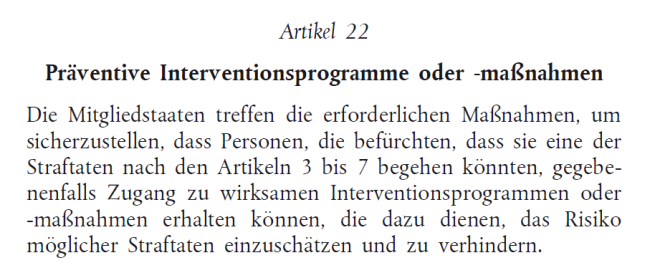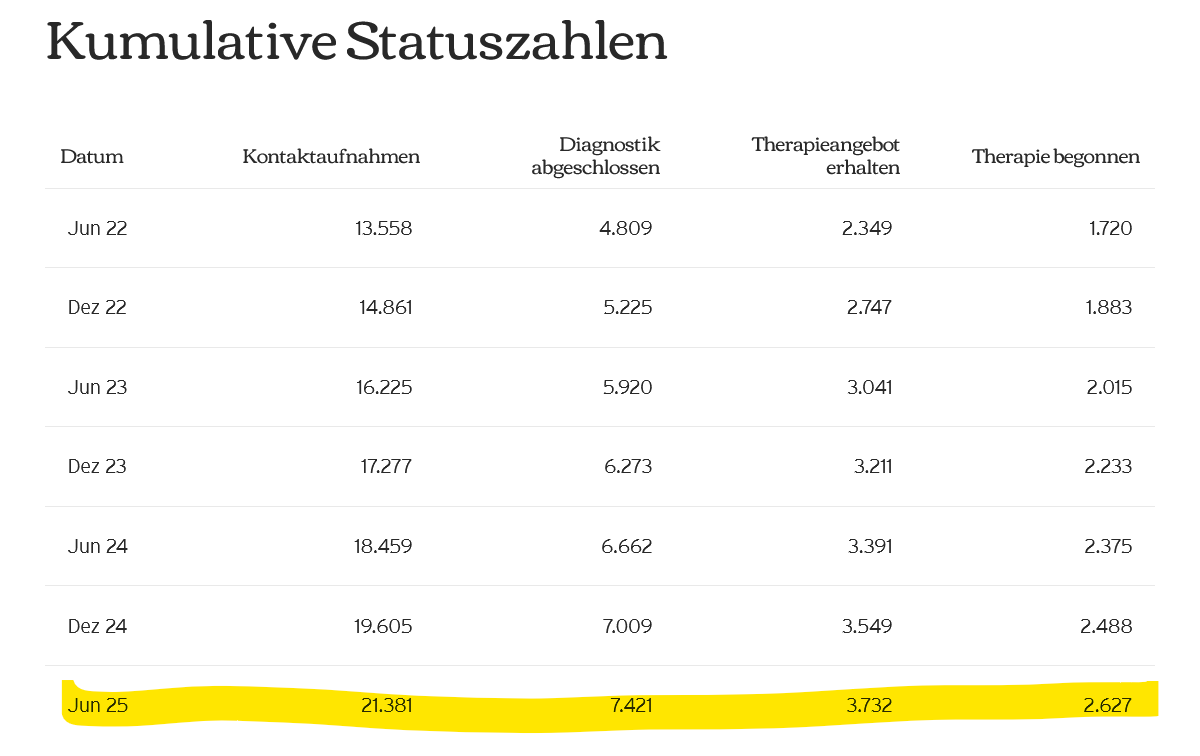20 years of “Don't Offend” aka “Prevention Project Dunkelfeld” — a report
This week on Monday afternoon, many interested people and some activists attended the anniversary event celebrating 20 years of the therapy project Don’t Offend (Prevention Project Dunkelfeld). Around 100-120 people gathered in a auditorium on the grounds right behind the Institute for Sexual Medicine in Berlin. I was among them.
Edit: Sirius' report at KiH, published 2 days later on 28th September 2025: https://kinder-im-herzen.net/blog/bericht-und-kommentar-jubilaeumsveranstaltung-20-jahre-ktw
The prevention network presented the event on its website, where you can also find an overview of the program. Various companions and pioneers were invited and spoke about developments in the past, wishes and ideas for the coming years, and the progress, scope, and current status of the evaluation study that has been ongoing since the beginning. Since I am on vacation, here is just an automatic translation by DeepL for now of the summary I wrote in German. It is not proofread, just translated for now. Hit me up, if there is nonsense in there. I will try to correct later once I have more time. Feel free to translate the German version yourself to maybe get a better result.
— start of pure DeepL-translation —
Summary of the event
In his welcoming remarks, Jerome Braun (Hänsel+Gretel Child Protection Foundation) praised the commitment of the staff and emphasized the courage of the people seeking help who turn to the therapy program. This was actually taken up several more times in the course of the event. However, he only mentioned the idea of prevention in relation to crime prevention.
The next speaker was Brigitte Zypries. The former Federal Minister of Justice has been involved in the project for a very long time and, as Mr. Beier later emphasized, played a significant role at the political level in helping to transform the Berlin-based “Prevention Project Dunkelfeld” into the nationwide “Prevention Network Don’t Offend” in 2008. Accordingly, she was also the first to address EU Directive 2011/92/EU, which calls for the establishment of appropriate therapy services in every EU country. With KTW, Germany is the first country within the EU to implement this.
The best protection comes not from prosecution but from prevention.

Her contribution otherwise dealt mainly with the circumstances surrounding the project's founding and further development, as well as the harmful influence of stigma and the equating of sexual orientation with crime. Since the coronavirus pandemic, the isolation of many people has worsened significantly, which is reflected in a general increase in mental health problems. The number of AI-generated depictions of abuse has also increased dramatically.
Hermann Gröhe, former Federal Minister of Health, once again emphasized the courage of the people who had turned to KTW. He was the first to address the need and right of pedophiles to have competent contact persons and emotional support – and that this is in no way contrary to caring for survivors of sexual abuse, as some short-sighted voices unfortunately still claim. He believes it is important to encourage individuals to make “healthy decisions for their own lives” and to focus on the mental health of people in need of treatment. Help against isolation and with the integration/acceptance of one's own sexuality not only helps clients but also clearly reduces the likelihood of abuse, according to Gröhe.
Fortunately, the network's expiring funding was extended by the cabinet in August for an initial period of three years.
Dr. Henrike Hartmann was supposed to represent the Volkswagen Foundation, which has been providing financial support for the project since its inception. As she was unable to attend in person, at least a video message was to be played, but there were technical problems with playing it loud enough. The video will therefore be made available online after the event.
Prof. Dr. Klaus Beier then spoke about the history and foundations of the therapy project. This included the research and findings that had demonstrated the need for this therapy program and motivated its founding in 2005. Ten years later, in 2015, an initial evaluation study showed that abusive acts among those treated had clearly declined, but the use of illegal content had hardly changed, which greatly concerned him and his colleagues. However, with time and the growing competence of the staff, as well as adjustments to the therapy concept that had been made since 2005, the relapse rate of therapy participants had fallen from an initial 76% to around 45% – and, interestingly, to 0% when medication was administered. He also highlighted points of criticism regarding the study design and explained the decisions. Above all, he explained why a randomized regular control group was not used (unethical, risks abuse, among other things).
I found it nice that he emphasized to the audience that pedophilia only becomes a disorder when someone either suffers or becomes abusive. He made it clear that without the disorder, there is nothing wrong with pedophilia and nothing to correct.
Mr. Beier also referred to EU Directive 2011/92/EU and showed what the EU had replied on April 19, 2024, when asked about the status of implementation of Article 22 shown above:
Infringement proceedings have been initiated against several Member States for the implementation of Directive 2011/92/EU (which are still ongoing). Some of these proceedings relate to Article 22 of the Directive in question.
Towards the end, he again made his pandemic comparison (treating the damage caused by sexual abuse in a similar way to a pandemic in terms of setting priorities for combating it) and presented his vision of designing digital devices in such a way that they are simply no longer suitable for the consumption of CSAM, instead of combating abuse documents themselves (detection and blocking via AI, emphasized without reporting to the authorities). Both points have triggered some fierce criticism: the pandemic approach, because in this context pedophiles have already been compared to pathogens, which does not exactly counteract our dehumanization; the AI blocking mechanism, because the governments and companies of the world give us little reason to trust them not to use such power for other purposes. But he is right about one thing: this is likely to become technically possible in the coming years anyway, and then corporations and governments would do whatever they want with it.
In my opinion, the best presentation was given by Dr. Anna Konrad, who described the therapy and how it has changed over time. As a pedophile who is concerned with destigmatization and helping those seeking help, this presentation appealed to me the most. Initially, the extent and diversity of comorbidities with which patients came to KTW were underestimated. Placing them all in the same groups proved to be insufficient. I can confirm this: even the slight neurodivergence of my ADHD made it very difficult for me to participate at times, and the group sessions dealing with relapses into CSAM use were almost a waste of time for therapy participants without this problem. At least they taught me how serious this issue can be. Addiction problems have long been a criterion for exclusion, but it was recognized that the expectation that patients could find addiction treatment elsewhere and deal with it independently of their pedophilic disorder was sometimes unrealistic. So ways were sought and found to address this within the framework of KTW therapy.
The program has been adapted to respond more individually to each person's situation. Today, there are groups with different focuses, individual sessions, and much more, which are used flexibly. Ms. Konrad used anonymized case studies to illustrate how the therapy goals and exact priorities were adjusted depending on whether, for example, there was psychological distress with or without realistic potential for abuse, an addiction, CSAM consumption, or intellectual disability. And when it comes to the need for therapy, she also emphasized that the focus is clearly not on pedophilia, but on whether there is a disorder according to ICD 11 or DSM 5:
The goal is to turn a “pedophilic disorder” into “pedophilia.”
30% of patients used medication (so-called “libido suppressants”) at least some of the time. Follow-up care was well attended, and there were even patients who had participated in the first therapy groups 20 years ago. According to Ms. Konrad, this underscores the considerable and ongoing need for contact persons on the subject.
In conclusion, she thanked the patients for their courage in standing up and embarking on the difficult path of therapy, because therapy is exhausting and it is always easier to stay on the couch and not change anything.
Prof. Dr. Stephan Mühlig from Chemnitz University of Technology finally presented the “Initial results of the evaluation of the model project in accordance with § 65d SGB V.” Since the start of the project, a truly comprehensive evaluation program has been underway, which is why patients like me who participated in the study were repeatedly asked to fill out a REALLY HUGE NUMBER OF QUESTIONNAIRES. The therapists, too, by the way. Against this backdrop, he repeatedly acknowledged the great effort that both patients and practitioners were willing to make for this purpose. Did I mention that this was an enormous amount of work? Nevertheless, according to Mühlig, a full 88% of the therapy participants actively took part in the study. If that's not a testament to the enormous will, willingness, and need to advance research and therapy options for people like us, I don't know what is!
Against this background, I would like to note that anyone who doubts whether the patients provided truthful information, for example regarding abuse or CSAM consumption, should consider the following. As the speaker emphasized, in a liberal society it is fundamentally impossible to obtain more reliable information than self-reported data on many of the issues surveyed—not without sacrificing the anonymity of participation. However, this high level of practical willingness, the exceptionally consistent participation in therapy sessions (also practical), and the questions about motivation for change (very high) do not fit with the assumption that the questionnaires were filled out with a large amount of bullshit.
On the contrary, these figures suggest a high degree of honesty and motivation.
I would like to mention two points to Mr. Mühlig:
At the beginning, he emphasized how important the aspect of anonymity is for patients. To ensure this, many factors are taken into account in quality management. Even the design and signage of the buildings are taken into consideration. And I can confirm that some patients also pay close attention to this.
Mr. Mühlig was the first to comment on AI-generated images of abuse, saying that there are also good arguments that they could be a “victimless” alternative and an outlet for people with pedophilic preferences, as they do not depict real abuse like real photos and videos do, thus removing the biggest argument for their illegality. However, he would rather see that it would be more difficult for those affected to break free from compulsive consumption and that it would sometimes trigger them to search for “real” material. To a certain extent, I can understand that: AI images are now extremely difficult to distinguish from photos, and I therefore consider it almost impossible that there will be a clear distinction between artificial images and photos online today or in the future. This gives me a lot to think about.
Finally, due to the late hour, Maximilian von Heyden led only a shortened version of the planned panel discussion. The main question: what do we want for the future?
- Sara Jahnke: greater awareness in society and among professionals, as well as a reduction in the enormous stigma. She also warned against the morally harsh approach that many people take to the issue today, which completely marginalizes pedophiles and only leads to reactance.
- Hannes Gieseler: a truly comprehensive range of services with locally accessible options for all those seeking help. He sees a need to catch up, especially when it comes to the question of how these services can be made sufficiently anonymous.
- Tillmann Krüger addressed the still insufficient dissemination of expertise. He would like to see more people (therapists, counselors, etc.) become more knowledgeable about the subject. Pedophilia in particular and sexual preference in general need to be incorporated more strongly into the training of social professions. This is a demand that I have been hearing repeatedly since 2006, but which unfortunately still seems to fall on deaf ears.
- Mr. Mühlig was concerned with how to approach other parts of the dark field and reach high-risk groups in particular. Studies of the darknet suggest that the consumption of CSAM has risen absurdly and that there is a lack of approaches to reach these consumers preventively.
- Heyden himself expressed regret that the framing of therapy as crime prevention is still so prevalent. He sees the focus lying elsewhere entirely.
I must note that I found the figures confusing: previous participant numbers were mentioned several times and compared with the number of contacts made. However, the exact figures appeared to be inconsistent, as if each speaker had quoted evaluations from a different source. I hope that a look at the slides, if they are made available online, will clarify this. However, I believe the figures in the last row here (source) were meant:

As a few of the speakers mentioned, the increasingly aggressive social rejection was also evident that evening: some people tried to disrupt the event at the entrance to the building, followed the high-ranking visitors and tried to gain admission without being registered. The security service dealt with the situation, but it is still quite intense to experience something like that.
I would like to conclude with a few words that Maximilian von Heyden had read out: a former therapy participant was originally supposed to take part in the panel discussion, but (if I understood correctly) this was rejected due to security concerns. Instead, the former participant wrote a few lines about what he would like to see happen in the next 20 years. His appeal:
It is essential to listen to pedophiles and to clearly distinguish between preference and action.
Add a comment
Note: Only short, unformatted text is currently supported as a comment. Long or complex texts may not be saved at all. Please send such content by email instead.

 English
English
 Deutsch
Deutsch